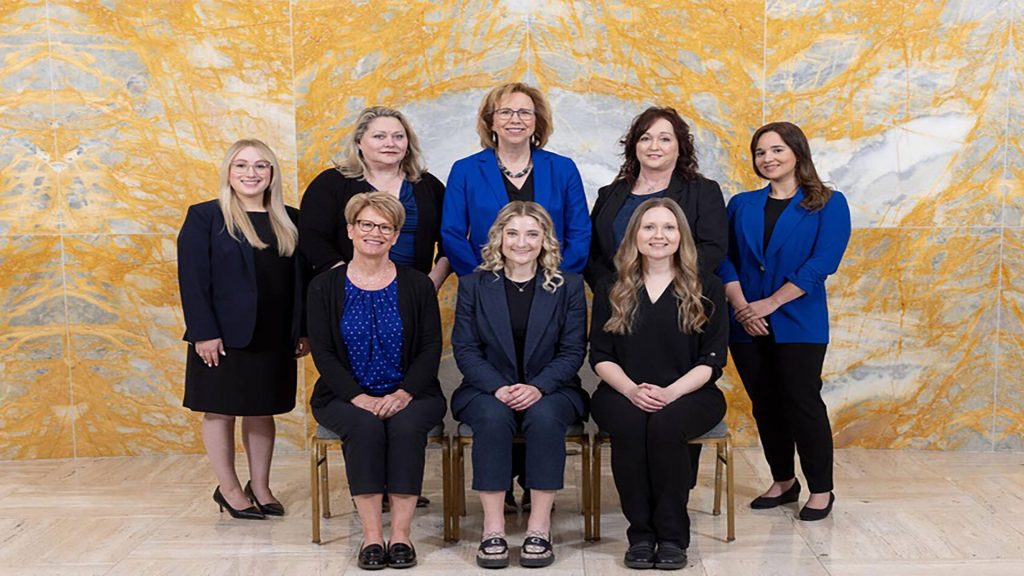-
Clinical Trials
Clinical trials team brings hope and dedication to colorectal cancer study

Back row left to right: Allison Berry, lead clinical research coordinator, Jessica O’Neill, senior research program coordinator, Janet Olson, Ph.D., principal investigator for the Voyage study, Bev Salisbury, associate clinical research coordinator and Angie Kostreba, clinical research coordinator.
Clinical trials can be a beacon of hope for many patients and can fuel the discovery of new advancements in healthcare. They represent the power of collaboration between volunteer participants and research teams who carefully collect data.
One clinical trials team at Mayo Clinic is working to test a screening tool for colorectal cancer, a leading cause of cancer deaths in the U.S.
Early detection of colorectal cancer may hold the key to saving lives.
In the Voyage study, the team is gathering real-world data on Cologuard, a noninvasive stool DNA screening test for colorectal cancer, and now has 150,000 participants enrolled. The participants will be tracked over a seven-year period.
The team conducting this study includes data librarians, statisticians and clinical research coordinators, who ensure the research is thorough and conducted responsibly. The team has worked in lockstep throughout the trial, now in its fifth year.
"The purpose of this study is to gather real-world evidence on Cologuard's impact on long-term outcomes in a large, diverse population, and so the overarching goal is to examine the colorectal cancer-related incidence and mortality in a cohort of people who had an order for the test kit," says clinical research coordinator Allison Berry.
"It is a prospective survey-based study, so we're looking at people going forward in time," she adds.
The participants enrolled in the study answered a baseline questionnaire about demographics and their health history. From there, Berry says, the team is building a data repository that documents any changes in their health or personal information over time.
Labor of love
The team notes that this study is a labor of love.
"People send us notes all the time; one person said they are doing this because their mother passed away, and they do not want anyone to go through this pain," says Berry. "I think just seeing the care, attention and investment that participants have makes our job rewarding."
The team notes that the work being conducted today within the study has implications for now and well into the future when it comes to those considering preventive measures such as early screening for colorectal cancer. They hope the data points they are collecting will provide lifesaving information and result in positive outcomes for patients.
"We're not just collecting data and keeping it," says clinical research coordinator Angie Kostreba. "We're concentrating on following up and continuing to validate what the participants have reported by checking in with their healthcare providers."
Senior program coordinator Jessica O’Neill emphasized that the effort put into the details of the clinical trial makes all the difference.
"When people hear about survey studies, they don't realize how much work goes into it," says O'Neill. "The research coordinators have fielded over 24,000 phone calls, 6,000 voicemails, 10,000 emails, 500,000 incoming documents and one million mailed outgoing documents."
The clinical research coordinators are critical to the work, their colleagues say.
"The clinical research coordinators have played a hugely important role in the success of the Voyage study,” says Janet Olson, Ph.D., the study's principal investigator. "As advocates for the study and the participants, the study coordinator team has been well prepared to ensure that all tasks were done with quality and integrity and that participants received timely responses to their inquiries about the study."
Members say that flexibility and cohesive team dynamics also are key to ensuring the study's success.
"We would not be here without everyone who helped get us to this point," says clinical research coordinator Jen Fondakowski. "We've been lucky to have such a phenomenal team for many years."
Mayo Clinic has a financial interest in the technology referenced in this news article. Mayo Clinic will use any revenue it receives to support its not-for-profit mission in patient care, education and research.







